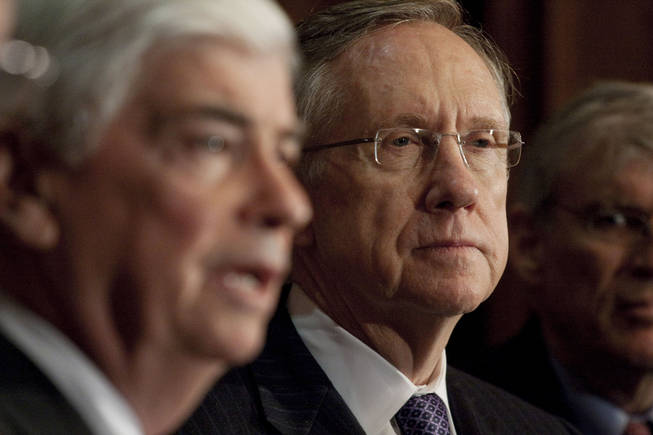
AP Photo/Harry Hamburg
Majority Leader Harry Reid listens as Sen. Christopher Dodd, D-Conn, speaks during a Democratic health care rally on Capitol Hill in Washington, Tuesday, Dec. 22, 2009.
Monday, Dec. 13, 2010 | 3:56 p.m.
Sun Coverage
Nevada lawmakers weighed in on a federal judge's decision in Virginia that the sweeping health care reform law Congress passed earlier this year is unconstitutional, handing a political victory to Republicans and Tea Partiers who have long been been calling for its repeal.
Judge Henry E. Hudson, a Bush appointee to the federal bench in Richmond, ruled that the health care bill violates the Constitution’s commerce clause by attempting “to compel individuals to involuntarily enter the stream of commerce.”
Nevada’s Republicans praised the ruling for reiterating a point they say they’ve been trying to make since before the bill passed.
“From the time that the Democrats passed this health care bill, the individual mandate was unconstitutional,” said Sen. John Ensign, who raised a constitutional point of order against the bill when it was being debated on the Senate floor. “Even if the majority party in Washington, D.C., refuses to acknowledge its unprecedented reach of power ... American people remain protected by the United States Constitution and the courts in this land.”
Rep. Dean Heller said: "The health care bill was flawed from the very beginning and this court decision is a victory for the American public."
In Carson City, incoming Gov. Brian Sandoval praised the ruling and pledged to continue to back Nevada’s participation in efforts to overturn the law.
“I am hopeful that Florida court will use the Virginia decision as legal precedent in its deliberations,” he said.
Both Sandoval and Ensign said they want to see the U.S. Supreme Court rule on the issue; Heller said Congress shouldn’t wait for that, but should work to change the law to avoid “add[ing] to our national debt or hurt[ing] our struggling economy” in the meantime.
Democrats, on the other hand, have been trying to spin the court’s ruling as a distraction and legal loose cannon.
“Opponents of reform have tried everything to protect insurance companies and block common-sense protections for middle-class families in Nevada and across the nation. That fight is over. It’s time to move on,” said Senate Majority Leader Harry Reid, who maneuvered the bill through the Senate on the back of 60 Democratic votes earlier this year. “Fourteen federal district judges have rejected lawsuits like this one, making this ruling an outlier.”
Hudson’s is not the first — or last — legal word on the subject.
The verdict comes just days before Nevada will bring its own suit, along with 20 other states, before a Florida court on the same question: challenging the constitutionality of a law that mandates citizens purchase a product, and fining them for failing to.
Nevada Attorney General Catherine Cortez Masto, a Democrat, refused to join that suit. Las Vegas attorney Mark Hutchison agreed to represent the state without a fee, though outgoing Gov. Jim Gibbons solicited donations to help cover other costs.
Both cases are expected to eventually end up before the Supreme Court, which hasn’t struck down a federal law for violating the commerce clause since 2000, when in a 5-4 decision, it invalidated parts of the Violence Against Women Act of 1994 (the case of U.S. v. Morrison).
Earlier this year, similar challenges were brought before federal district court judges in Detroit and Lynchburg, Va. In both cases, the health care law’s constitutionality was upheld. A total of eight lawsuits against the law have been filed in various federal courts around the country.
For now, Hudson’s ruling isn’t expected to have a tangible effect on the distribution of health care — and not just because a long appeals process is all but guaranteed. The provision of the health care law that has been the key magnet for the challenge is the mandate to buy health insurance, but that doesn’t actually kick in until 2014.
What it will likely do, though, is embolden those calling for the ouster of the overhaul in the coming Congress.
The GOP, which takes over the majority in the House of Representatives in a few weeks, has made repeal of the health care law one of its top policy objectives.
Not every objection to the health care law is existential. Members of both parties have said elements of the health care bill like 1099 reporting requirements, which require medical providers to itemize every purchase in excess of $600, and Medicare compensation, which indexes reimbursements paid to doctors who serve Medicare patients to inflation, should be corrected to reduce costs to providers and keep the system humming along.
Some Democrats in the Senate tried to defuse one of those live wires earlier this month when they tried to pass an unfunded fix to the IRS’s 1099 requirement, but Senate Finance Committee Chairman Max Baucus, its chief backer, wasn’t able to get a simple majority of senators to vote for it, much less anything filibuster-proof.
Republicans have since rebuffed Democrats’ attempts to rework a funded compromise (a fix to the requirement is expected to cost $19 billion), leaving Republicans a perfect hook with wide appeal upon which to hang a greater attempt at undoing the health care bill.
The health care overhaul bill was passed earlier this year on a party line vote in the Senate and a near-party line vote in the House (some Democrats split off to vote “no,” while not a single Republican voted for it).
Sun reporter Cy Ryan contributed to this report.


Join the Discussion:
Check this out for a full explanation of our conversion to the LiveFyre commenting system and instructions on how to sign up for an account.
Full comments policy